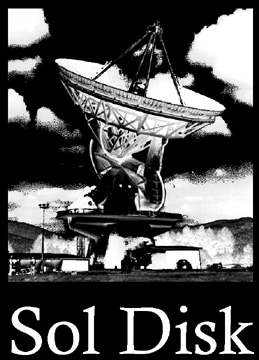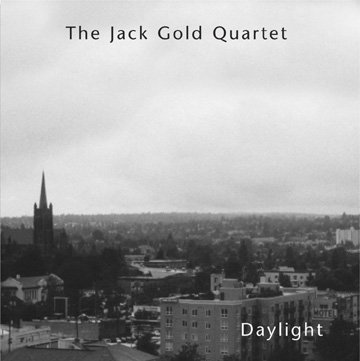Daylight
Jack Gold Quartet | Sol Disk
Track Listing: So-No, Spiritual, Out Alone, Shelter, Nightfall, Homeless
Personnel: Michael Monhart--soprano and tenor saxophones; Jim Knodle--trumpet, small percussion; Michael Bisio-accoustic bass; Jack Gold--drums, small percussion
 Daylight, a set of "instantly composed" tunes, opens with a seaching blend, trumpet, sax, bass and drums poking around for common ground, arguing and jostling each other for position until Michael Monhart's tenor saxophone asserts itself, sounding raw and wounded. Then Jim Knodle's trumpet takes a turn, straight at you, with a bit a truculence in his tone. The song is "So-No," and an undercurrent of
Daylight, a set of "instantly composed" tunes, opens with a seaching blend, trumpet, sax, bass and drums poking around for common ground, arguing and jostling each other for position until Michael Monhart's tenor saxophone asserts itself, sounding raw and wounded. Then Jim Knodle's trumpet takes a turn, straight at you, with a bit a truculence in his tone. The song is "So-No," and an undercurrent of
ready-to-explode intensity pervades, even in the lower tempos.
 The "spontaneous composition," "free jazz" side of sound proves itself an aquired taste here, with lots of contentious interplay that includes generous and welcome doses of "small percussion," clatters and rattles that add interesting textures to the horns/bass/drums approach. The impression here is of a spirited and high energy CIMP session group influenced by the Art Ensemble of Chicago.
The "spontaneous composition," "free jazz" side of sound proves itself an aquired taste here, with lots of contentious interplay that includes generous and welcome doses of "small percussion," clatters and rattles that add interesting textures to the horns/bass/drums approach. The impression here is of a spirited and high energy CIMP session group influenced by the Art Ensemble of Chicago.
 "Spiritual" lies back a bit, in contrast to the opener, coming in with that "small percussion" and Michael Bisio's loping bass, with Michael Monhart switching—a few minutes in—from tenor to soprano saxophone, leaning Eastward with long, sweet sinuous lines.
"Spiritual" lies back a bit, in contrast to the opener, coming in with that "small percussion" and Michael Bisio's loping bass, with Michael Monhart switching—a few minutes in—from tenor to soprano saxophone, leaning Eastward with long, sweet sinuous lines.
 Jack Gold holds down the drummer's seat, and this is one of those you might guess, based on a blind listen, is a drummer-led effort. His percussion mode is often aggressive in a way that keeps his band sounding fiery and on edge, by turns pushing things toward chaos then reigning the sound back in structure's direction. He sounds like roiling thunderhead clouds on "Shelter." And having said that, Gold goes mainly textural on the disc's closer, "Homeless," behind a relatively straightahead horn duel.
Jack Gold holds down the drummer's seat, and this is one of those you might guess, based on a blind listen, is a drummer-led effort. His percussion mode is often aggressive in a way that keeps his band sounding fiery and on edge, by turns pushing things toward chaos then reigning the sound back in structure's direction. He sounds like roiling thunderhead clouds on "Shelter." And having said that, Gold goes mainly textural on the disc's closer, "Homeless," behind a relatively straightahead horn duel.
 Not for those uninitiated in the joys of instantly composed sounds, but a bracing and invigorating listen to those who've been there.
Not for those uninitiated in the joys of instantly composed sounds, but a bracing and invigorating listen to those who've been there.
The Jack Gold Quartet - DAYLIGHT
One of the (most) salient points the liner notes make on this great improvised CD is that the players (Jack on drums, Michael Bisio on bass, Michael Monhart on reeds & Jim Knodle on brass & percussion) have "forged their own way"... thet they don't "fit the mold, or let themselves (or their music) be defined by externals. I have listened to & reviewed many albums these players have been on, or soloed on, & I couldn't agree more. "DAYLIGHT" stands out as an example of music supremely inspired, but with the individual players' personality shining through brightly with the energy of the suns! Doug Haire recorded this, which (I think) makes a big contribution (that's especially true, since he recorded the very first Zzaj Productions CD, too). Every little nuance is captured in a fashion that lends balance to the overall album... even when th' horns are blasting, you can still hear th' little shakers down under. If you want to educate your ears, & get "hip" to where th' new jazz sound is coming from (Seattle, of course, in a style I think I'm coining a new term for - "funge")! This album (though it is jazz-based) just ROCKS, people! It not only gets a MOST HIGHLY RECOMMENDED, I deem it to be the "PICK" of this issue for "best improv quartet"! Rotcod Zzaj, Improvijazzation Nation #67, November 2004
Jack Gold Quartet
Daylight
WOW, what a great album! The cd begins with the same energy found on some of the great saxophone records of the late sixties, think Ayler, Coltrane, etc..., but unlike so many artists of today who emulate this style and period, Gold and company play with the maturity and self-control of a group who actually play together and really have something to say. Michael Monhart's reeds soar from the start. His playing is controlled and thoughtful without losing the edge or intensity necessary for this genre of improvisation. Jim Knodle's trumpet work, occasionally reminiscent of Lester Bowie, interweaves itself into the fabric of the improvisations creating numerous beautiful moments and interesting harmonies. His beautiful wood flute work highlights and is indicative of the group's varied styles, moods and emotions. Their use of little instruments and space produces a lighter, softer texture in the manner of the Art Ensemble of Chicago or other AACM amalgamations. Jack Gold's percussion fits every aspect of the album. He easily propels the band through the heavier passages and has the touch and ear to augment his group's contributions during the less hectic moments, never over-playing, or over-shadowing his band mates. The bass playing of Michael Bisio is the glue that binds these pieces together - His arco playing is achingly beautiful, and his presence on any album continually ensures worthwhile listening.
 Daylight presents a group that plays with energy and excitement, while exhibiting maturity and a firm sense of tradition.
Daylight presents a group that plays with energy and excitement, while exhibiting maturity and a firm sense of tradition.
Herb S., Platter Chatter, Nov.-Dec. 2004
JACK GOLD, DAYLIGHT, SOL DISK 1102.
So-No / Spiritual / Out Alone / Shelter / Nightfall / Homeless. 55:47
Gold, d, djembe, perc; Michael Monhart, ss, ts; Jim Knodle, tpt, flt, perc; Michael Bisio, b. 11/9/02, Seattle, WA.
 The music on (Daylight) represents a very strong effort from drummer Jack Gold's quartet. This advanced music -- with a foothold in the early roots of the avant-garde -- features a forceful horn contingent in saxophonist Monhart and trumpeter Knodle, who spin out interlaced free passages while Gold and exceptional bassist Bisio wrap the gushing sounds with tightly-wrapped asymmetric rhythms. Seattle's Jack Straw Productions has released as CDs several live broadcasts recently, and this original radio performance more than matches the level of excitement established by its previous efforts. Monhart and Knodle make a formidable front line as they open the gates for aggressive and explosive music to gush forward, collide, and redirect into rampaging white water. Monhart does it with cascading soprano spirals and torrid tenor drills. Knodle uses a stimulating wooden flute and small percussion in addition to his main axe to keep the pressure at peak intensity.
The music on (Daylight) represents a very strong effort from drummer Jack Gold's quartet. This advanced music -- with a foothold in the early roots of the avant-garde -- features a forceful horn contingent in saxophonist Monhart and trumpeter Knodle, who spin out interlaced free passages while Gold and exceptional bassist Bisio wrap the gushing sounds with tightly-wrapped asymmetric rhythms. Seattle's Jack Straw Productions has released as CDs several live broadcasts recently, and this original radio performance more than matches the level of excitement established by its previous efforts. Monhart and Knodle make a formidable front line as they open the gates for aggressive and explosive music to gush forward, collide, and redirect into rampaging white water. Monhart does it with cascading soprano spirals and torrid tenor drills. Knodle uses a stimulating wooden flute and small percussion in addition to his main axe to keep the pressure at peak intensity.
 Gold sets the pace by spewing out a wide range of drum and small percussion patterns. His djembe exercises become motivating accent marks behind the reed/brass improvisations and alongside Bisio's emphatic tonal density. Bisio is all over his bass on this date, spouting off rapidly with complexly constructed passages and then establishing the high ground with full-chorded intensity. The six selections gel as spontaneous compositions where each artist adds his personalized signature to the collective effort. High register squeals from the woodwinds and brass, for example, intertwine in Ayleresque fashion with explosive drum/bass lines to propel "Nightfall," and a similar sense of agitated urgency exists on the other songs. This session is full of muscle and drive, but its congealing nature makes it an integrated package of significant free music.
Gold sets the pace by spewing out a wide range of drum and small percussion patterns. His djembe exercises become motivating accent marks behind the reed/brass improvisations and alongside Bisio's emphatic tonal density. Bisio is all over his bass on this date, spouting off rapidly with complexly constructed passages and then establishing the high ground with full-chorded intensity. The six selections gel as spontaneous compositions where each artist adds his personalized signature to the collective effort. High register squeals from the woodwinds and brass, for example, intertwine in Ayleresque fashion with explosive drum/bass lines to propel "Nightfall," and a similar sense of agitated urgency exists on the other songs. This session is full of muscle and drive, but its congealing nature makes it an integrated package of significant free music.
Frank Rubolino, Cadence, March 2005

